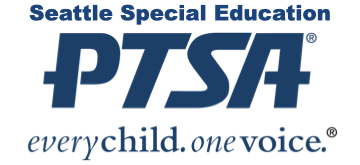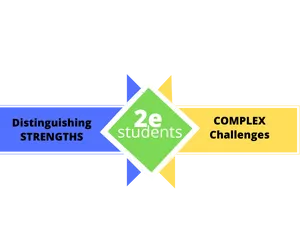Dear School Board Directors, Superintendent Jones, and Senior Staff,
Last May, when the School Board passed Policy 2190, the Seattle Special Education PTSA testified about our concerns regarding disabled students who are also cognitively atypical, or twice-exceptional (2e) students, under the new Advanced Learning initiatives. Specifically, we were concerned about whether the new screening procedures would identify these students for advanced learning and the lack of information about how 2e students will be served under the new plans for advanced learning.
The family survey that was recently sent to K-8 families is ableist and it creates a barrier to neurodivergent families instead of providing 2e students with access to services they need and are entitled to. It perpetuates the decades-long problem of putting the burden on families, requiring them to be savvy in order for students to receive intervention, and focuses on sensitive personal practices that have no bearing on a student’s cognitive profile. We ask that SPS retract the survey and replace it with a non-ableist family survey.
We assume that the survey is intended to elicit information about a student that may not be well represented in school testing or school participation and support that purpose. However, the survey asks parents to identify traits that represent cooperative and compliant students. While some 2e students fit this profile, many do not. We know that 2e students can be intense and disruptive, we know that many have social challenges, we know that many are not compliant to neurotypical norms. Thus, our concern is that by answering the survey truthfully 2e students will be excluded from advanced learning opportunities.
For example, in one question parents are asked to rate whether their children speak a different language at home. This appears to be a step in the right direction because it supports the idea that students may be verbally highly capable but unable to demonstrate that strength in written English assignments. However, the format of the question will result in a rating of bilingual opportunity, not capability, and will not provide insight into the student’s verbal cognition. Additionally, it denies the possibility that the student’s talent is hidden due to learning disabilities such as dyslexia or dysgraphia, not due to bilingualism. In a non-ableist construct, the question could ask directly for verbal skills such as posing a question like, “List some ways that your student displays verbal talents that are unlikely to be captured by English-language reading and writing assignments.”
Other questions require families to disclose personal information that is unlikely to be pertinent to determining a child’s cognitive atypicality. For example, it is unclear how, “Following spiritual or faith-based traditions,” and “Can you share one or two holidays and/or traditions that your family celebrates that represent your culture and legacy?” relate to cognitive atypicality. These questions may also be impossible to answer for a variety of people who are not comfortable sharing their private and emotional experiences without first establishing trust, such as many neurodivergent people.
There are other ways in which ableism, linked to the legacy of white supremacy, appears in the survey. Manners and politeness are a white supremacist construct, and many neurodivergent students are not interested in either. Social skills and teamwork are often lagging skills for 2e students, and relationship building is difficult when you are surrounded by people who experience the world differently than you. The inability to care for self in an age-normed way is one of the hallmarks of many cognitively atypical people. Many 2e students have lagging executive function skills, so things like organizational skills and time management are highly challenging for them. Questions about a student’s recognition of emotions, willingness to share them with others and to seek support are ableist. Asking any vulnerable student or family to do this outside of an environment they know to be safe denies their lived experience.
The Special Education PTSA supports family surveys as a way to obtain information that is not readily available in school assessments and observations. However, this survey should focus on determining whether students present in a way that is cognitively atypical and mandates specialized intervention. For example, non-ableist questions could include the following:
- What kind of supports does your student need to demonstrate their abilities and reach their potential? What is their school missing when we evaluate them without those supports?
- Does your child easily fit into a classroom social structure? If not, what are some differences you notice? Does your child relate more easily to a different population?
- Is your child curious? What do they do when they are curious about something? What motivates your child to work and investigate?
- Does your child have any passionate interests such as a sport, dance, music, social justice issue, storytelling, etc.? How do they pursue those interests?
- Does your child demonstrate any behaviors that are surprising and admired by others in your personal community?
- Where do you see your child thrive or excel in a way that may be missed by teachers or others around them?
In short, while this family survey may be intended to elicit evidence of advanced learning potential outside the school observation, it instead creates yet another barrier that many families cannot overcome. Again, we urge you to stop using this survey and substitute a more appropriate, non-ableist survey that will not have the effect of excluding neurodivergent students.

